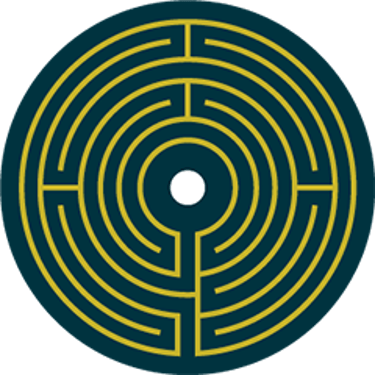A labyrinth has many turnings,
none of them wrong.
The path can be walked
with sure and certain knowledge
of reaching and experiencing
the centre, home.
~ Carole Ann Camp,
Labyrinths from the Outside In
A labyrinth has many turnings,
none of them wrong.
The path can be walked
with sure and certain knowledge
of reaching and experiencing
the centre, home.
~ Carole Ann Camp,
Labyrinths from the Outside In
Sometimes in life, we become at odds with or lose connection with ourselves. We may lose touch with our inherent value or become absorbed with the needs and expectations of others, forgetting what is true for us. Sometimes this happens early on and we don't remember ever being a different way. Losing contact with our innate capacity for creativity, joy and ease is painful. We might seek relief in escape behaviours such as driving ourselves hard to achieve, losing ourselves in romantic relationships, caretaking others, consuming something to numb the pain, or always being on-the-go, with the busyness drowning out the signals from within that things aren't quite ok. These strategies may offer temporary respite, but work less well over time, increasing our estrangement from ourselves. But no matter how far we have drifted, there is a voice that calls us home.
A therapeutic partnership is unlike any other relationship. The therapist joins with the client to focus their keen attention on a whole lived life, with all of its complexities, depths, and richness. It is an intimate interaction, but never imposing. The relationship is grounded in safety, respect, nonjudgment, and compassionate regard. This holding space makes it possible to approach places that could be difficult to visit alone. Ultimately though, it is the client who walks the path. The therapist, an ally on the pilgrimage. They bring a different mind to the client's situation, one that is not subject to the same blind spots. In this place, they become collaborators, developing new understandings that open up alternate possibilities. In this way, that which is unresolved can be brought to completion.
Therapy is not about fixing or improving ourselves, even though this might be the motivation that brings us into the room. And of course, positive changes can reasonably be expected. But the deeper work doesn't happen through efforts of will, cleverness, or hard work. Founder of humanistic psychology, Carl Rogers tells us that it is only when he was able to accept himself exactly as he was, that he was able to change. In this curious paradox lies the therapeutic way. The path and the destination are one and the same—a return to friendship with ourselves.
Considering therapy
Transcending down into the ground of things is akin to sweeping the leaves that cover a path. There will always be more leaves. And the heart of the journey, the heart of our own awakening, is to discover for ourselves that the leaves are not the ground, and that sweeping them aside will reveal a path, and finally, that to fully live, we must take the path and keep sweeping it.
~ Mark Nepo, Being Here
Transcending down into the ground of things is akin to sweeping the leaves that cover a path. There will always be more leaves. And the heart of the journey, the heart of our own awakening, is to discover for ourselves that the leaves are not the ground, and that sweeping them aside will reveal a path, and finally, that to fully live, we must take the path and keep sweeping it.
~ Mark Nepo, Being Here




